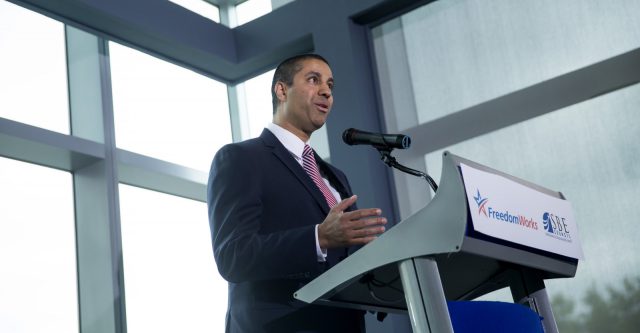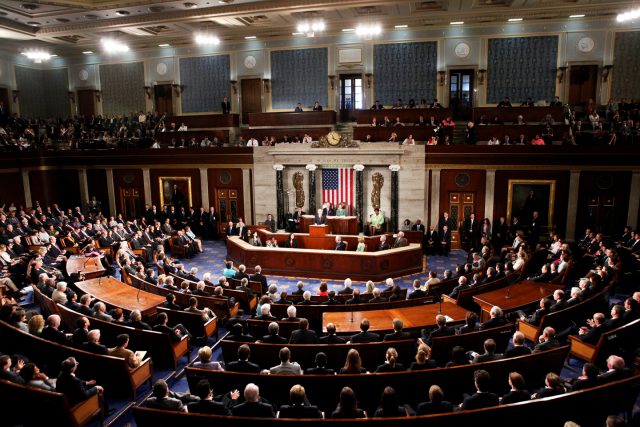
Pai
WASHINGTON (Reuters) – The head of the U.S. Federal Communications Commission unveiled plans on Tuesday to repeal landmark 2015 rules that prohibited internet service providers from impeding consumer access to web content in a move that promises to recast the digital landscape.
FCC chief Ajit Pai, a Republican appointed by President Donald Trump in January, said the commission will vote at a Dec. 14 meeting on his plan to rescind the so-called Net Neutrality rules championed by Democratic former President Barack Obama that treated internet service providers like public utilities.
The rules barred broadband providers from blocking or slowing down access to content or charging consumers more for certain content. They were intended to ensure a free and open internet, give consumers equal access to web content and prevent broadband service providers from favoring their own content.
The action marks a victory for big internet service providers such as AT&T, Comcast and Verizon Communications that opposed the rules and gives them sweeping powers to decide what web content consumers can get and at what price.
It represents a setback for Google parent Alphabet Inc and Facebook, which had urged Pai not to rescind the rules.
With three Republican and two Democratic commissioners, the move is all but certain to be approved. Trump, a Republican, expressed his opposition to Net Neutrality in 2014 before the regulations were even implemented, calling it a “power grab” by Obama.
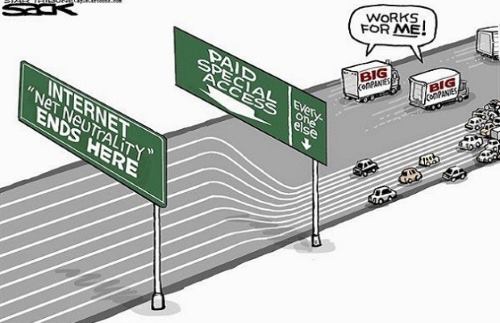 Pai said his proposal would prevent state and local governments from creating their own Net Neutrality rules because internet service is “inherently an interstate service.” The preemption is most likely to handcuff Democratic-governed states and localities that could have considered their own plans to protect consumers’ equal access to internet content.
Pai said his proposal would prevent state and local governments from creating their own Net Neutrality rules because internet service is “inherently an interstate service.” The preemption is most likely to handcuff Democratic-governed states and localities that could have considered their own plans to protect consumers’ equal access to internet content.
“The FCC will no longer be in the business of micromanaging business models and preemptively prohibiting services and applications and products that could be pro-competitive,” Pai said in an interview, adding that the Obama administration had sought to pick winners and losers and exercised “heavy-handed” regulation of the internet.
“We should simply set rules of the road that let companies of all kinds in every sector compete and let consumers decide who wins and loses,” Pai added.
Tom Wheeler, who headed the FCC under Obama and advocated for the Net Neutrality rules, called the planned repeal “a shameful sham and sellout. Even for this FCC and its leadership, this proposal raises hypocrisy to new heights.”
AT&T, Comcast and Verizon have said that repealing the rules could lead to billions of dollars in additional broadband investment and eliminate the possibility that a future presidential administration could regulate internet pricing.
‘HEAVY COSTS’
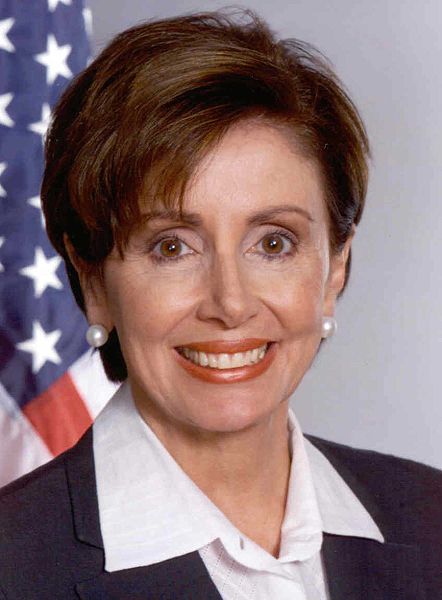
Pelosi: FCC move will hurt consumers and chill competition.
Verizon said it believed the FCC “will reinstate a framework that protects consumers’ access to the open internet, without forcing them to bear the heavy costs from unnecessary regulation.”
The Internet Association, representing major technology firms including Alphabet and Facebook, said Pai’s proposal “represents the end of Net Neutrality as we know it and defies the will of millions of Americans. This proposal undoes nearly two decades of bipartisan agreement on baseline Net Neutrality principles that protect Americans’ ability to access the entire internet.”
Pai’s proposal would require internet service providers to disclose whether they allow blocking or slowing down of consumer web access or permit so-called internet fast lanes to facilitate a practice called paid prioritization of charging for certain content. Such disclosure will make it easier for another agency, the Federal Trade Commission, to act against internet service providers that fail to disclose such conduct to consumers, Pai said.
A U.S. appeals court last year upheld the legality of the Net Neutrality regulations, which were challenged in a lawsuit led by telecommunications industry trade association US Telecom.
The group praised Pai’s decision to remove “antiquated, restrictive regulations” to “pave the way for broadband network investment, expansion and upgrades.”
The FCC’s repeal is certain to draw a legal challenge from advocates of Net Neutrality.
Nancy Pelosi, the top U.S. House of Representatives Democrat, said the FCC move would hurt consumers and chill competition, saying the agency “has launched an all-out assault on the entrepreneurship, innovation and competition at the heart of the internet.”
Republican Senator John Thune said Pai’s plan was an improvement over the Obama rules but that “the only way to create long-term certainty for the internet ecosystem is for Congress to pass a bipartisan law.”
The planned repeal represents the latest example of a legacy achievement of Obama being erased since Trump took office in January. Trump has abandoned international trade deals, the landmark Paris climate accord and environmental protections, taken aim at the Iran nuclear accord and closer relations with Cuba, and sought repeal Obama’s signature healthcare law.
Pai, who has moved quickly to undo numerous regulatory actions since becoming FCC chairman, is pushing a broad deregulatory agenda. Pai said he had not shared his plans on the rollback with the White House in advance or been directed to undo Net Neutrality by White House officials.
The FCC under Obama regulated internet service providers like public utilities under a section of federal law that gave the agency sweeping oversight over the conduct of these companies.
Language in the new proposal would give the FCC significantly less authority to oversee the web. The FCC granted initial approval to Pai’s plan in May, but had left open many key questions including whether to retain any legal requirements limiting internet providers conduct.
His plan also would eliminate the “internet conduct standard,” which gave the FCC far-reaching discretion to prohibit internet service provider practices deemed to violate a list of factors and sought to address future discriminatory conduct.
Reporting by David Shepardson; Editing by Will Dunham
 WASHINGTON (Reuters) – The U.S. Supreme Court on Monday refused a request by the Trump administration and the telecommunications industry to wipe away a lower court decision that had upheld Obama-era net neutrality rules aimed at ensuring a free and open internet, though the justices’ action does not undo the 2017 repeal of the policy.
WASHINGTON (Reuters) – The U.S. Supreme Court on Monday refused a request by the Trump administration and the telecommunications industry to wipe away a lower court decision that had upheld Obama-era net neutrality rules aimed at ensuring a free and open internet, though the justices’ action does not undo the 2017 repeal of the policy.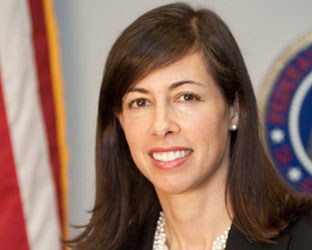


 Subscribe
Subscribe

 Pai said his proposal would prevent state and local governments from creating their own Net Neutrality rules because internet service is “inherently an interstate service.” The preemption is most likely to handcuff Democratic-governed states and localities that could have considered their own plans to protect consumers’ equal access to internet content.
Pai said his proposal would prevent state and local governments from creating their own Net Neutrality rules because internet service is “inherently an interstate service.” The preemption is most likely to handcuff Democratic-governed states and localities that could have considered their own plans to protect consumers’ equal access to internet content.
